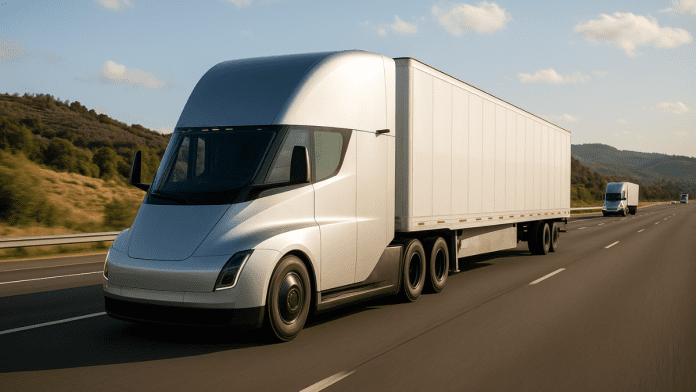🕒 Last updated on September 29, 2025
Electric trucks were once seen as a distant dream. Some experts said they would never work for long-distance transport. Others believed electric power was only good for small cars and city use. But real-world numbers now show something very different. Electric trucks are not just possible—they are already taking over major markets faster than anyone imagined.
China’s Silent Truck Revolution
Over the past few years, one country has quietly changed the entire story: China.
Just a few years ago, almost no electric heavy trucks were on the road. Today, tens of thousands are being sold every single month. More than 79,000 medium and heavy electric trucks were sold in 2024 alone. In just the first half of this year, another 81,000 were sold.
In August, electric heavy truck sales nearly tripled compared to the previous year. Around 26% of all heavy trucks sold that month were electric, and 29% of medium trucks were plug-in models. Even 22% of light-duty trucks went electric.
This is not a small trend. It is a total transformation happening in real time. Two of the biggest battery makers say that half to nearly all heavy trucks could be electric by 2028. These trucks are not toys or test vehicles—they are delivering real cargo every day across long distances. The main reason is not fancy technology. It’s simple math.
Economics Beats Opinions Every Time
Truck companies do not care about hype. They care about cost. Transport businesses run on thin profit margins. If one option is even slightly cheaper, they switch—fast.
At first, electric trucks were expensive to buy. But now battery prices have fallen to around $90 per kilowatt hour, making large packs more affordable. Electricity costs much less per kilometer than diesel. Maintenance is also cheaper because electric motors have fewer moving parts. Even insurance costs are going down for electric fleets.
While electric trucks still have a higher upfront price, the running costs are so low that companies recover the extra money quickly. Once long-haul electric trucks reach a price close to $250,000, which experts expect around 2030, they will be cheaper to own and operate than diesel trucks in most countries.
This economic shift has already crushed other alternatives. Natural gas trucks were once seen as the future in some regions. But their short-lived boom faded the moment electricity became cheaper.
Europe Joins the Race While Others Fall Behind
China may be leading today, but Europe is not far behind. It depends more on road freight than the United States, so its demand for efficient trucks is huge.
A leading European manufacturer recently sold its 5,000th electric truck. Another company revealed a powerful electric semi with 600 kilometers of range, a 48-ton load capacity, and fast charging during mandatory driver rest breaks. That means no wasted time—charge while the driver eats or rests, then get back on the road.
BMW issues recall for 200,000 vehicles after engine starter problem causes fire risk
Many of these European truck makers also dominate the American market. In fact, they already account for more than half of heavy truck sales in the United States. That may be one reason behind the recent decision to place a 25% tariff on imported electric trucks. Some countries are worried they will be left behind as foreign brands begin to take over their transport fleets.
Meanwhile, a well-known electric car company from the U.S. has barely made a dent in this race. Its futuristic pickup truck has sold only around 50,000 units, and its electric semi-truck remains more of a test model rather than a mass-market product. While public debates focus on flashy prototypes, quiet factories in China and Europe are already mass-producing real vehicles.
The biggest impact of all this isn’t just about trucks. It’s about fuel. Heavy trucks burn half of China’s road fuel, even though they make up only 15% of vehicles. That means electrification in this sector will cut oil demand much faster than electric cars ever could. One report estimates that China alone will eliminate 1.76 million barrels per day of fuel demand next year due to electric transport. That’s equal to one out of every 45 barrels of oil produced worldwide.
This sudden drop is catching many by surprise. In 2017, a major energy agency completely left out electric long-haul trucks from its cost analysis, calling them “too unrealistic to model.” Now, those same trucks are rolling past diesel stations every day.
Electric trucks are no longer a concept. They are no longer part of future predictions. They are here, they are scaling fast, and they are reshaping global industries without waiting for permission. No heated argument or public debate could stop this shift—because the road always belongs to those who move cheaper, faster, and smarter.

